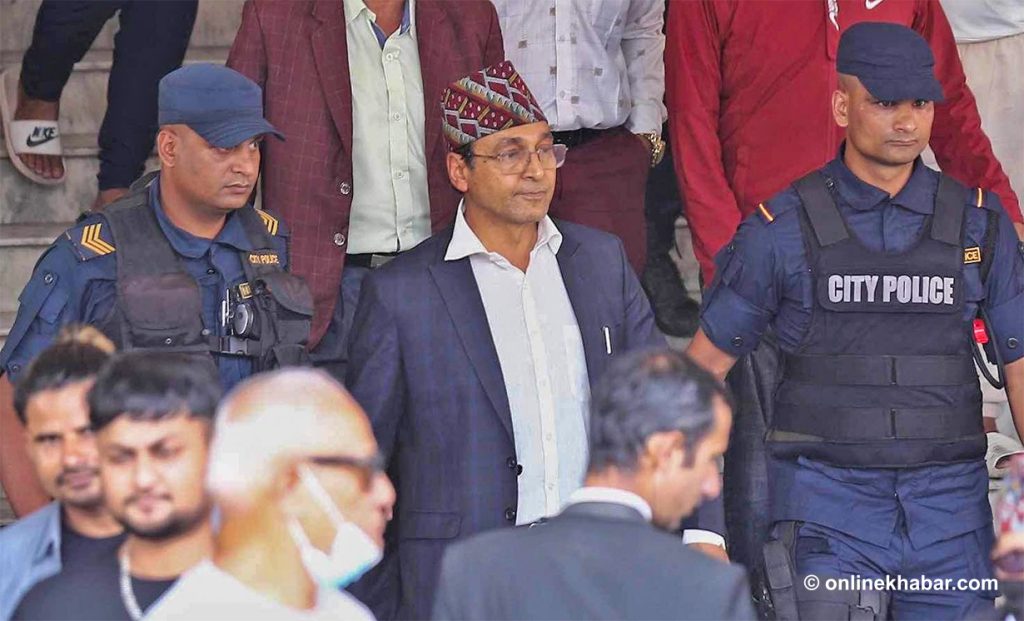
The notion that everyone deserves a second chance extends to our legal system, where prisoners can potentially be granted exemption based on their demonstrated good behaviour. The Prisons Act of 1963 and the corresponding regulations have established clear criteria for this option, though it may not be extended to individuals convicted of particularly grave offences.
For years, the country’s prison administrators, commonly known as jailers, have been granting the exemption to the inmates at their discretion. In doing so, the law has been misused to serve the interests of political parties, leaders, and high-ranking officials.
However, amidst the controversy surrounding Yog Raj Dhakal‘s (aka Regal) presidential pardon, the full bench of the Supreme Court expressed reservations about how the provision was used. This cast doubts on the process and decision-making within Nepal’s criminal justice system.
As per a summary of the verdict issued on November 2, moving forward, the victim’s consent will be a requisite before pardoning a criminal. Moreover, upon a prisoner’s release, due consideration must be given to their social reintegration and compensation. This fundamentally implies that decisions regarding imprisonment can no longer be solely determined by prison officials or the prevailing political and administrative leadership.
The bench led by Justice Ishwor Prasad Khatiwada, along with Sapna Pradhan Malla and Dr Kumar Chudal has expressed the view that the rights of victims and their entitlement to justice, as outlined in the Constitution of Nepal and similar laws, should be intricately linked to the consent of crime victims.

They stressed that the rights of victims of the crime, as outlined in Article 21 of the Constitution, should not be overlooked or considered less significant when interpreting and applying Article 276 of the Constitution of Nepal or any other relevant Nepali laws.
Article 276 of the Constitution pertains to the reduction and remission of penalties and fines. Meanwhile, Article 21 addresses the rights of crime victims, affirming that “Crime victims have the right to seek justice, including social rehabilitation and compensation.”
The Supreme Court has offered a fresh perspective that underscores the importance of not overlooking the role of the victim when prisoners are released from incarceration. Dr Rajit Bhakta Pradhanang, a professor of criminology, has commented that the Supreme Court’s ruling provides a significant interpretation in support of the victims and is likely to have a lasting impact.
The new law

Until now, only the duration of imprisonment and the conduct of the prisoners were taken into account when considering the exemption from imprisonment as part of the prisoners’ social rehabilitation. Once the prescribed period of incarceration was completed, the prison administration would readily label them as ‘well-behaved.’ However, now the presence of the victim has become mandatory.
“Throughout the crime’s execution, there was substantial theoretical discourse emphasising the importance of not overlooking the victim’s role and the necessity to obtain the victim’s consent before granting concessions to the perpetrator,” he says. “The Act was formulated per the provisions in the Constitution of Nepal. Now, there is a comprehensive explanation for its implementation.”
The Supreme Court has raised questions regarding the treatment of the victim when President Ram Chandra Paudel, on the recommendation of the Council of Ministers, pardoned Yog Raj Dhakal on the occasion of Constitution Day, celebrated on September 20.
The Supreme Court has posed inquiries regarding whether the state has furnished social rehabilitation and compensation to the victims. The court order states, “Was the victim’s consent obtained or not?”
These questions remain unanswered.
The Supreme Court has mandated careful consideration of five additional aspects in addition to the legal constraints when making decisions regarding the release of prisoners. This is to ensure that the rights of victims are safeguarded, and justice, including compensation, is upheld.
The Supreme Court has previously stressed the importance of making release decisions in alignment with the directives and established principles of the Supreme Court. Furthermore, it is recommended to take into account public interests, as well as interests and concerns.
The order specifies, “An order should only be issued after the objective basis and a valid rationale for the decision has been disclosed.”
Think about the victim

Following the enactment of the Crime Victim Protection Act (2018) and the establishment of the compensation fund, victims experienced some relief, and they played no role in the criminal case. The Supreme Court underscored that obtaining the victim’s consent should become mandatory when reducing or mitigating the offender’s punishment.
“The actions and decisions taken to reduce the prison sentence of Yog Raj Dhakal, the offender, appeared not to align with Article 21 of the Constitution. Hence, the court cannot grant judicial recognition,” the Supreme Court’s order states. “The decision to reduce Dhakal’s remaining prison sentence was found to violate the rights of crime victims as provided in Article 21 of the Constitution.”

When it comes to the rights of crime victims, Nepal is ahead of other South Asian countries says Pradhanang.
“There are not many nations that have protected the constitutional rights of victims and have supplemented them through legislation. In this regard, Nepal stands out as a leading country in South Asia,” he says. “The Supreme Court’s interpretation will not only influence Nepal but could also serve as a model for other nations.”
In the context of Nepal’s well-established criminal justice system, provisions for the exemption from imprisonment of offenders and the granting of amnesty have been introduced. While assessing the eligibility for exempting offenders from imprisonment, factors such as their conduct, and the nature and severity of the crime are considered. However, there has been no examination of concessions from the victim’s perspective.
To replace civil law, the new criminal code introduced in 2018 has imposed stricter provisions for imprisonment. Convicts in cases involving murder and heinous crimes no longer have access to the privilege of prison exemption, but this change did not consider the role of the victims.
Criminologist Pradhanang says that the Supreme Court’s decision will help restore balance, addressing the rising disparities and irregularities in the release of prisoners and the granting of amnesties in Nepal.
“This measure appears to be a deterrent to the practice of granting prison sentences arbitrarily based solely on the legal timeframe. With the victim’s consent now being necessary, it is anticipated that this will significantly restrain the discretionary authority of the prison administration,” he says.
“It appears that the current legislation may require amendments to facilitate the implementation of this judgment, and certain legal provisions may need to be added. We currently have limited information based on the brief order, but a more detailed approach may be provided in the full-text, which will aid in determining the future course of action.”
























